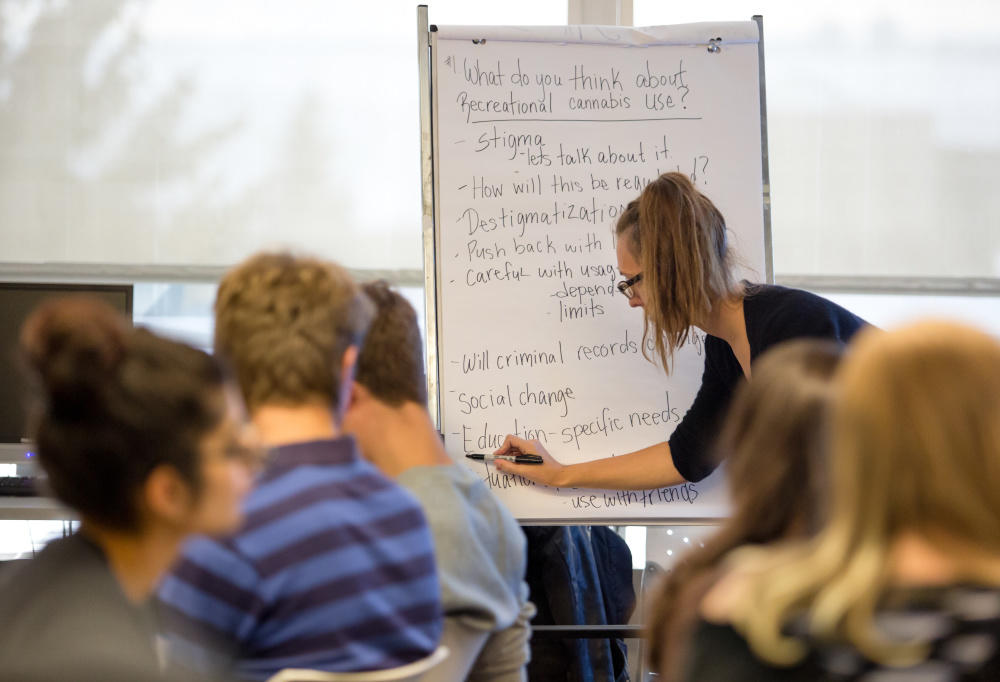April 17, 2019
Is cannabis legalization the new Y2K?

What do cannabis legalization and Y2K* have in common? Both had a lot of build-up, a lot of preparation, and both were non-events.
“I’ve seen the reports and truth be told, we’ve had fewer incidents since legalization than before legalization,” according to Rick Gysen, director of Campus Security at the University of Calgary.
If this surprises you, Gysen says it shouldn’t. “Because the City of Calgary’s cannabis bylaw says cannabis cannot be used in public spaces like campus, it’s hasn’t been much more than a blip on our radar,” he says.
Debbie Bruckner, senior director of student wellness, access and support, says she noticed the same trend after cannabis legalization, except one major change she’s happy to support — harm reduction.
Let’s talk cannabis
“Clinically speaking, legalization hasn’t changed what we see on campus,” Bruckner says. “But, from a harm reduction perspective, legalization has given us many more opportunities to have open, broad discussions about cannabis use.”
She says conversations before legalization about purchasing and consuming cannabis were absent from mainstream dialogue in our culture and on campus.
“We have seen this at various events since legalization — people want to talk about cannabis and they want to engage in discussion about harm reduction,” Bruckner says. “That's a very positive thing that gives us the opportunity to provide resources about safe-use guidelines and the stigma around using substances.”
She says a presence of the cannabis discussion at campus fairs, workshops and events has been crucial to getting the message out about safe use and available resources, like the Post Alcohol Support Space (PASS), harm-reduction workshops, courses and events like the Cannabis Café.
“When discussions about substances revolve around crime and punishment, it does not create an environment where people are comfortable asking for help,” Bruckner says. “Instead, helping people manage their substances and engaging in open conversation, we are literally saving lives.”

Before legalization on Oct. 17, 2018, students, faculty and staff were invited to the Cannabis Café.
Riley Brandt, University of Calgary
The future of cannabis
Cannabis is an ever-evolving topic in our country’s zeitgeist, but there are some major changes to look out for in the future of legalization.
“If municipalities consider relaxing the rules around public consumption at festivals and in our parks, it will probably change our context in some way,” Bruckner says. In the short term, her eye is on the imminent legalization of ingestible cannabis — also known as edibles.
“There could be some habit changes on campus if and when edibles become legal,” Bruckner says. “Because the effects take longer, there's concern that people will not feel the effects right away and ingest more than what’s advisable.”
Currently, for any campus community members who have overconsumed cannabis, alcohol or both, there's a medically supervised, judgment-free space on campus to wait out their ill-effects — the PASS.
Harm reduction in action
PASS first opened its doors in January 2018 as a judgment-free, harm-reducing option for campus community members in need of a safe space to wait out the effects of alcohol. By October of 2018, PASS’ scope broadened to include cannabis.
“Since September, PASS has had 15 guests and only one visit was due to the combined effects of cannabis and alcohol,” Bruckner says, adding that before legalization, there was only one guest who had used cannabis.
PASS is open Thursday evenings and for special events. Call Safewalk at 403.220.5333 to request an escort from any on-campus location to PASS for yourself or for someone you’re with.
* Y2K was the nickname of a pervasive — and as it turned out, largely unfounded — fear in the late 1990s that computers worldwide could fail as their two-digit internal calendars tried to roll over in the year 2000 from "99" to "00."
Learn more about cannabis on campus in the university’s Cannabis Policy.
Interested in this topic?
- Learn more about our research into cannabis and the benefits and drawbacks of legalization
